President's Message
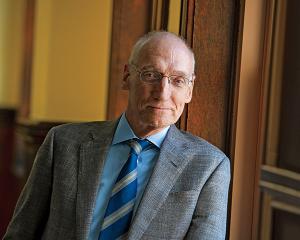
When I was inaugurated as Teachers College’s 11th president a little more than two years ago, I envisioned a virtuous circle for the College: By building a stronger and more effective TC, we could boost our capacity to help build a stronger and more equitable society. And by marshaling our resources to achieve our broader social goals, we could become a stronger and more effective and sustainable institution.
Of course, none of us envisioned the terrible pandemic that has now gripped the world for more than a year. But far from forcing us to abandon our game plan, the pandemic has fortified our resolve to execute it.
As one of our wonderful teacher educators remarks elsewhere in this Annual Report, the pandemic, in many ways, has not surfaced new challenges.
Let us think about it:
The pandemic did not create an inequitable school system that reinforces disparities between the haves and have-nots rather than leveling the playing field.
The pandemic did not give rise to a system in which people with economic means enjoy access to quality health care, while poorer Americans are disproportionately affected by all manner of ills, from chronic disease to the coronavirus.
The pandemic did not weave racism and racial injustice into the fabric of our society.
What the pandemic did was to bring these bitter realities and issues into much sharper relief. In so doing, it has generated pressure and momentum to bring about genuine and long-overdue social and economic change throughout our society.
It should come as no surprise that Teachers College has long been at the forefront of many of these efforts for the advancement of social justice. Since its founding 136 years ago, the College has been a place where great minds conduct groundbreaking research, apply it to the challenges facing families, schools and communities, and inform policies at the highest levels of government in the United States and abroad.
What we have not always been is a place where our great thinkers work in concert, or where the pathways that help them collaborate are well-established and easily traveled — or where potential partner organizations could readily identify where the resources they needed were housed within the College.
Looking back on 2020, I am proudest that our community not only has endured and survived the pandemic, but also has been galvanized by it. Quite simply, and without in any way minimizing the pain and loss we all have endured, we have rededicated ourselves to our commitment to creating a smarter, healthier, more equitable and just world — and we are building a smarter, better coordinated and more equitable Teachers College that will be more effective and consequential going forward.
In this annual report, you’ll read about many of our efforts, and you’ll see how changes inside TC have magnified our impact beyond our walls.
You’ll learn, for example, how our faculty are partnering with schools nationwide to transition to online teaching and learning — and how that work is informing efforts to centralize digital resources and create a stronger digital infrastructure within TC.
You’ll read about research advances that are addressing poverty, hunger, emotional stress and other major consequences of the pandemic. And while we continue to be a leader in research, you’ll also learn about a new effort to tap our wealth of untapped potential by facilitating interdisciplinary collaboration and enabling a wider range of faculty to secure funding for their work.
You will relive the powerful ways that the TC community rallied around nationwide protests against the police killings of George Floyd, Ahmaud Arbery, Breonna Taylor, Tony McDade, David McAtee and other unarmed Black Americans, including Michael Brown, Eric Garner, Philando Castile, Walter Scott, Samuel DuBose, Laquan McDonald, Alton Sterling, and 12-year-old Tamir Rice. We recognize that these are just the more recent murders and acknowledge the long history of unjustified police killings in the United States. You will read about the efforts of our faculty and alumni to fight institutionalized racism in the political arena, academia and the courts.
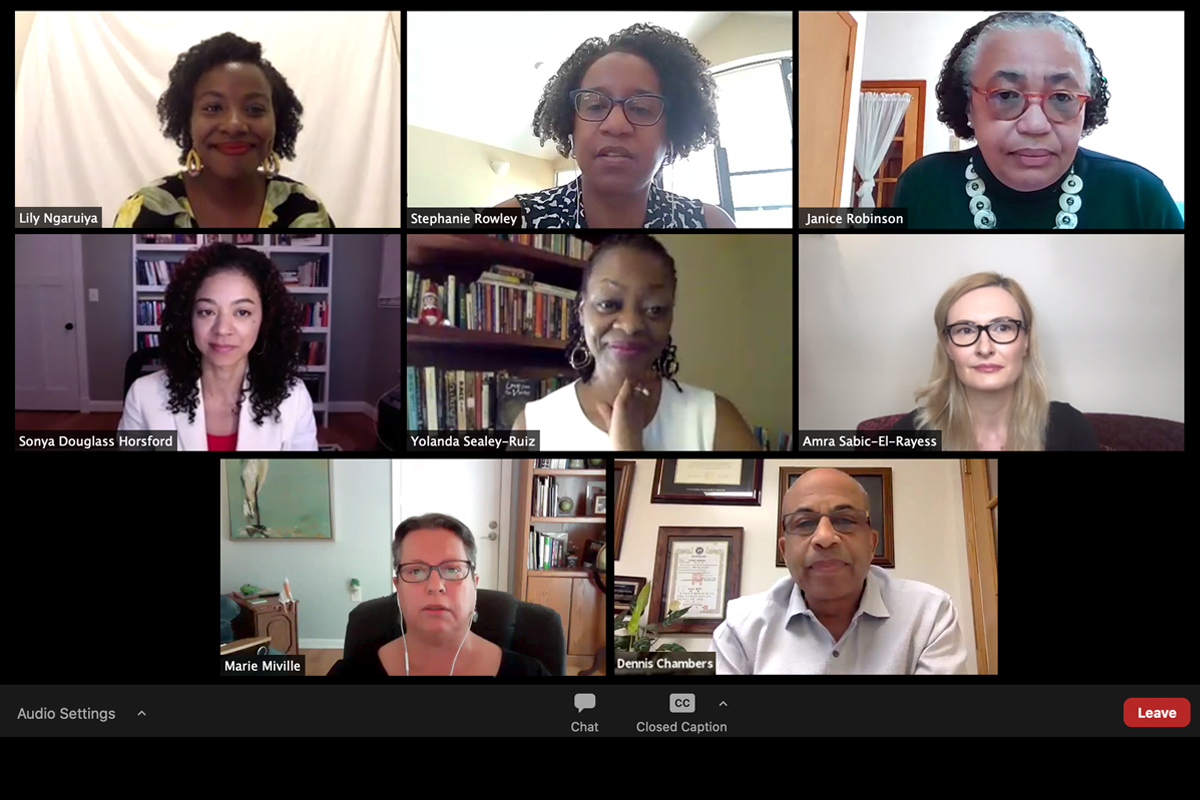
COMMUNITY OUTPOURING Following police killings of unarmed Black Americans in spring 2020, more than 400 TC community members participated in a virtual gathering led by administrators, faculty and staff. Top row, from left: Lily Ngaruiya, Academic Affairs & Equity Coordinator; Provost Stephanie Rowley; Janice Robinson, Vice President for Diversity & Community Affairs. Middle row, from left: Sonya Douglass Horsford, Associate Professor of Education Leadership; Yolanda Sealey-Ruiz, Associate Professor of English Education; Amra Sabic-El-Rayess, Associate Professor of Practice. Bottom row: Marie Miville, Professor of Psychology & Education and Vice Dean for Faculty Affairs; Dennis Chambers, Public Safety Officer II. (Photo: TC Archives)
And as you read about the heroic efforts of many of our alumni working in schools, hospitals and clinics across the nation, you’ll also learn about a new career development hub we have created that helps students plan their careers and works with graduates throughout their lives to help them pivot and thrive in the face of changing markets and industries.
There are two additional stories that I want to call out in this letter.
The first is the tale of our “essential people” — the dedicated and courageous members of our Office of Public Safety, our maintenance and facilities teams, and many others who came to campus, day in and day out, during the darkest and most uncertain periods of the pandemic. While most of us have worked from the comfort of our homes, they have put their health and safety on the line to help relocate hundreds of our students during the pandemic’s earliest weeks, and thereafter to keep our campus safe, clean and ready for the day we can all return. On behalf of the entire Teachers College community, I offer them our deepest gratitude and appreciation.
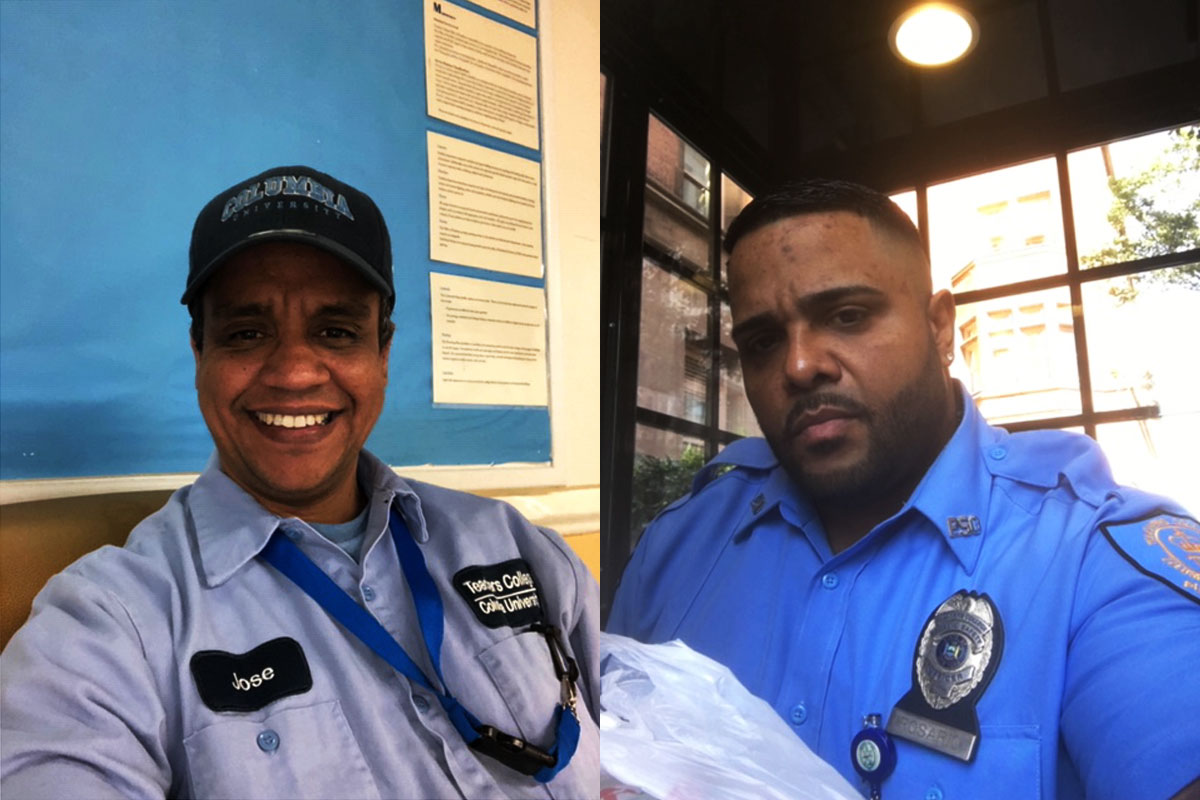
ESSENTIAL PERSONNEL Members of TC's Office of Public Safety, the College's maintenance and facilities teams, and many others have come to campus day in and day out during the pandemic. Above: Jose Sanchez (left), Custodian II, and Josue Rosario, Public Safety Officer II. (Photos: TC Archives)
The other story woven throughout this entire annual report is the narrative of how we are doubling down on TC’s founding social justice mission by embedding in all of our work a laser-like focus on diversity, equity, inclusion and justice.
The College was created to help immigrant families adapt to life in the United States. During the Jim Crow era, we were the destination of choice for aspiring Black teachers from the South. The 1970s saw the creation of our Institute for Urban and Minority Education (IUME) by our beloved and nationally renowned Dr. Edmund W. Gordon, who is celebrating his 100th birthday in June. And, during the 1990s, we launched our Minority Post-Doctoral Fellowship program to create opportunities for people of color to become university faculty.
But the events of the past year have magnified the importance of our social justice mission, prompting us to redouble our commitment to diversity, equity, inclusion and justice. Today, our efforts to create change are driven by the knowledge and wisdom of America’s diverse communities. Our annual Reimagining Education Summer Institute acquaints educators with teaching strategies that honor and reflect the experiences and perspectives of an ever more diverse population of students — and students themselves are often among the presenters. Our Black Education Research Collective enriches Black education through studies that assess the lived experiences of Black communities during the pandemic and mine the history of education conducted by peoples of African descent in the Americas. Our Bilingual Latinx Mental Health Concentration is one of just a few nationwide to offer culturally appropriate training in delivering mental health services in Spanish to the Latinx population.
Again, this work is complemented and supported by parallel efforts within TC. These include internal climate surveys, curriculum mapping, work by faculty to decolonize their own academic fields, and the recent appointment of a new Vice Dean for Faculty Affairs whose brief is to ensure a climate for hiring and career advancement that benefits faculty from all disciplines and all backgrounds.
Many people have contributed to these changes, but there is one person who, year after year, has been our engine, our conscience and our guiding spirit: Janice S. Robinson, Esq. (M.Ed. ’76), Vice President for Diversity & Community Affairs, Associate Professor of Higher Education, and the College’s Title IX Coordinator.
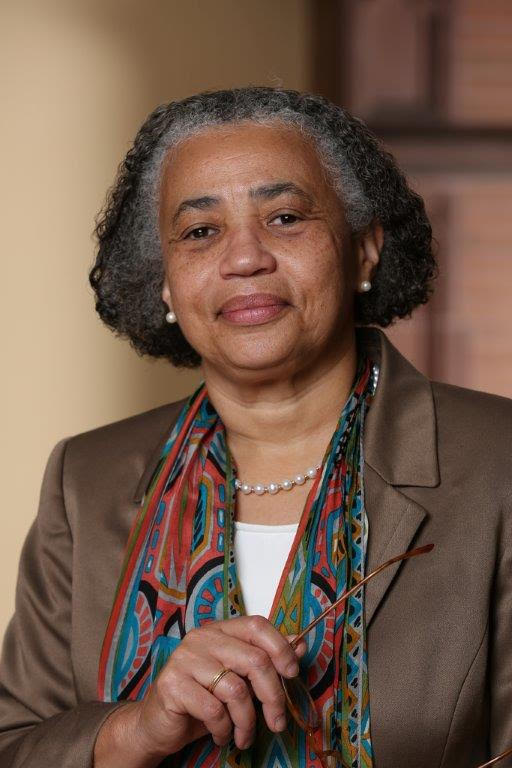
ADVANCING EQUITY Janice Robinson, Vice President for Diversity & Community Affairs, has been the guiding spirit behind TC's efforts to advance diversity, equity, inclusion and justice. (Photo: Bruce Gilbert)
Year after year, Dr. Robinson’s office sponsors research that spotlights injustice and advances the cause of equity, produces a rich array of events that celebrate our community and, in times of tragedy, hosts gatherings that reaffirm our common humanity. Beyond being present at nearly all these events, Dr. Robinson spends her days tirelessly walking our halls — or now, on Zoom — to meet, listen, engage, connect and do all the other behind-the-scenes work that keeps the wheels of our community turning.
Thank you, Dr. Robinson, for all that you do to keep us all “in community.”
In closing, I want to acknowledge that this has been a year during which each of us, in our own lives, has suffered loss. At Teachers College, we also lost two beloved members of our community.
In March of 2020, Lambros Comitas, Gardner Cowles Professor of Anthropology & Education, passed away at the age of 92. As both a student and faculty member, Professor Comitas spent more than 76 years at Columbia and TC, spanning an era that extended from Nicholas Murray Butler and Margaret Mead to the first days of the COVID pandemic. He launched TC’s current program in Applied Anthropology & Education, helped to shift the field of anthropology in order to focus on the problems and issues of modern industrial society, and mentored hundreds of students who have since made their mark in a variety of fields.
Last month, Ye (Angel) Wang, Professor of Deaf & Hard of Hearing, passed away at the untimely age of 43. Professor Wang believed passionately in the ability of all children to learn. She helped to demonstrate that deaf and hard-of-hearing children could learn to read through a system of visual phonics. Her work has paved the way for many subsequent advances and provided a powerful rationale for the improvement of cochlear implants and other hearing technologies.
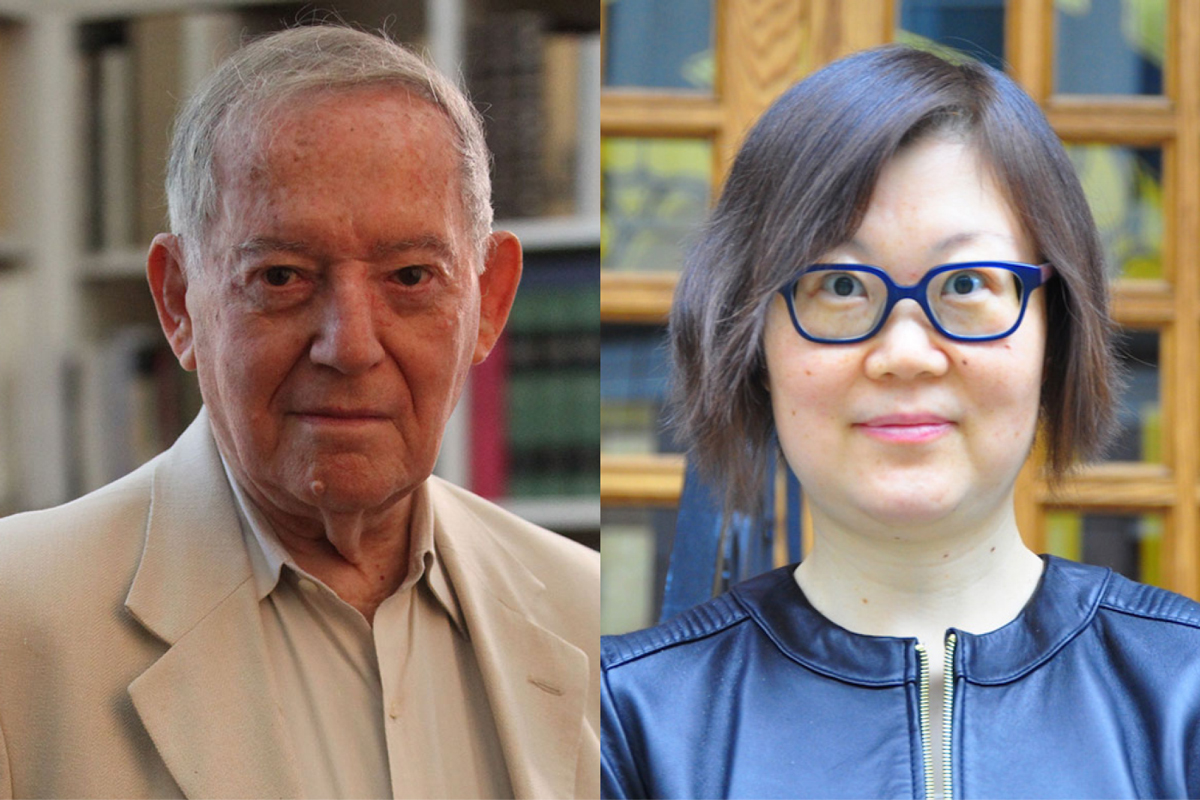
IRREPLACEABLE Since the pandemic began, the TC community has mourned the loss of faculty members Lambros Comitas, 92, an anthropologist who was a leading authority on the Caribbean, and Ye (Angel) Wang, 43, a trailblazer in the field of Deaf and Hard of Hearing. (Photos: TC Archives)
Professors Comitas and Wang represented vastly different fields and generations, but they both embodied TC’s ongoing commitment to building a smarter, healthier, more equitable and just world. They will continue to inspire us as we move forward during this time of challenge and change.

Thomas Bailey
President